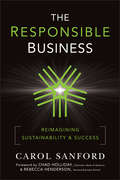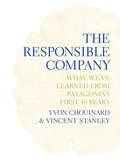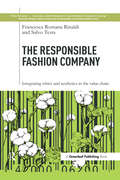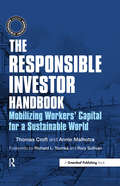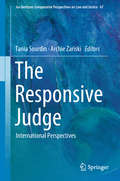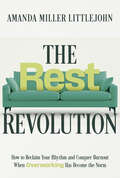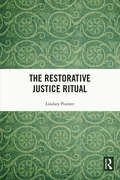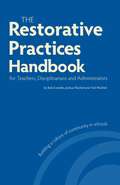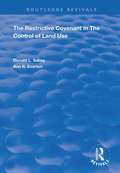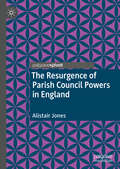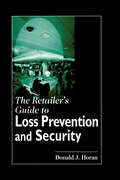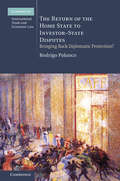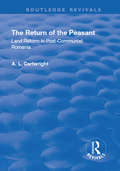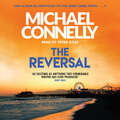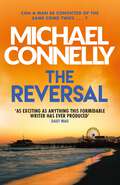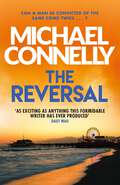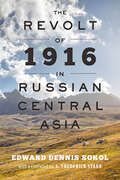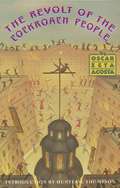- Table View
- List View
The Responsible Business
by Rebecca Henderson Chad Holliday Carol Sanford"When most people think of corporate responsibility, they are focusing on a business's effect on and relationship to stakeholders. A Responsible Business sees stakeholders as full partners and meaningful instruments for the evolution of healthier communities and more successful businesses."--from the IntroductionThe Responsible Business offers a new and strategic approach to doing business that holistically integrates responsibility into all aspects of an organization, allowing for returns at every level, business and social. This book goes beyond the often well intentioned but limited attempts at sustainability to present a framework that allows organizations to bring responsibility into everything they do and re-imagine success. From innovation, product development, and production processes to business management, strategic planning, and shareholder development, the author shows how being a Responsible Business is a practical skill that can be applied day-to-day at every level of the business.No longer just the role of a department or the job of CSR professionals, successful responsibility and business efforts start at the business level, are then taken to the corporate level, and are finally applied throughout the organization. The Responsible Business outlines a framework for building a responsibility and consciousness infrastructure that applies a living systems view to the business and inspires all of its stakeholders, including shareholders.Throughout the book, illustrated by examples from technology to manufacturing, large and small, public and private, Sanford demonstrates how to make responsibility integral to all aspects of a business as an engine for innovation, profitability, and purpose.Praise for The Responsible Business"This is a very significant book. It makes it clear that businesses have a single boss with five interrelated aspects. The stories are among the crispest, most evocative case histories I have seen. The book is for any corporate leader trying to do the impossible: create a business that recreates the world."--Art Kleiner, editor-in-chief, strategy + business, and author, The Age of Heretics"Carol Sanford offers us a proven, practical, and systems-based approach that integrates five stakeholder groups into a business system working as an integral whole. Essential reading for leaders wanting a system framework for sustainability and business success!"--Otto Scharmer, MIT Sloan senior lecturer; author, Theory U: Leading from the Future as it Emerges; and coauthor, Presence"The Responsible Business challenges many assumptions corporate leaders, investment advisors, and sustainability experts have long taken for granted. It provides a road map that can help innovative businesses think about how to be truly transformational."--Sam Ford, Fast Company expert blogger and director, Peppercom"The powerful concepts in The Responsible Business have changed the process of sustainable development and how communities truly thrive. Indeed, these proven approaches will be the roadmap to truly achieve the deepest level of living communities."--Bill Reed, founding member of LEED System and coauthor, The Integrative Design Guide to Green Building"Critical for re-imagining the future of business. Rarely a day goes by that I do not call on this way of thinking and looking at the world. It is useful for taking on the big business decisions that so many of us face every day."--Chad Holliday, chairman, Bank of America
The Responsible Company
by Yvon Chouinard Vincent StanleyThe Responsible Company, by Yvon Chouinard, founder and owner of Patagonia, and Vincent Stanley, co-editor of its Footprint Chronicles, draw on the their 40 years' experience at Patagonia - and knowledge of current efforts by other companies - to articulate the elements of responsible business for our time.Patagonia, named by Fortune in 2007 as the coolest company on the planet, has earned a reputation as much for its ground-breaking environmental and social practices as for the quality of its clothes. In this exceptionally frank account, Chouinard and Stanley recount how the company and its culture gained the confidence, by step and misstep, to make its work progressively more responsible, and to ultimately share its discoveries with companies as large as Wal-Mart or as small as the corner bakery.In plain, compelling prose, the authors describe the current impact of manufacturing and commerce on the planet's natural systems and human communities, and how that impact now forces business to change its ways. The Responsible Company shows companies how to reduce the harm they cause, improve the quality of their business, and provide the kind of meaningful work everyone seeks. It concludes with specific, practical steps every business can undertake, as well as advice on what to do, in what order.This is the first book to show companies how to thread their way through economic sea change and slow the drift toward ecological bankruptcy. Its advice is simple but powerful: reduce your environmental footprint (and its skyrocketing cost), make legitimate products that last, reclaim deep knowledge of your business and its supply chain to make the most of opportunities in the years to come, and earn the trust you'll need by treating your workers, customers and communities with respect.
The Responsible Fashion Company: Integrating Ethics and Aesthetics in the Value Chain
by Francesca Romana Rinaldi Salvo TestaIn The Responsible Fashion Company, Rinaldi and Testa argue that the fashion industry is at a crossroads: the need for a global shift to a sustainable model has never been more urgent. Yet, they demonstrate that we are witnessing a revolution led by conscious consumers and enlightened companies, who are redefining the rules of the fashion market. The question is: when will the rest of the industry catch up? Rinaldi and Testa raise a fundamental but often neglected issue in the fashion sustainability debate: long-term equilibrium can only be achieved by integrating economic goals with environmental, social and ethical values. "The Responsible Fashion Company" provides a clear overview of the theory, challenges and opportunities of sustainability in the industry and demonstrates how fashion companies can achieve competitive advantage through sustainable innovation. The authors show how leading fashion companies are challenging traditional thinking and present inspiring examples from pioneers such as Gucci, Levi's, Timberland and Brunello Cucinelli, who create quality products without leaving a negative impact behind.Refreshing and timely, The Responsible Fashion Company is essential reading for the socially conscious consumer and anyone with a professional or personal interest in the fashion, design and luxury industries.
The Responsible Investor Handbook: Mobilizing Workers' Capital for a Sustainable World (The Responsible Investment Series)
by Thomas Croft Annie MalhotraFor decades, workers’ capital stewards have invested wisely to provide a secure retirement for millions of people around the world. This money – our money – represents an enormous share of economic and capital market wealth. It has seeded and grown innumerable innovative industries that have had far-reaching impacts. However, the 2008 financial crisis has seriously threatened these trusted assets and drained away prosperity.In response, a growing number of investors are moving towards responsible investment policies and strategies, addressing the rising expectations of consumers and benefiting from the financial advantages such strategies bring. Everyday citizens now want to see their investments not only do well, but do good. But, what constitutes responsible investment, and how can it be undertaken in practice? What is the impact of responsible investment strategies on investment performance? How can trustees, managers and advisors implement these strategies in line with their fiduciary responsibilities? How can plan trustees and staff members convince all stakeholders of the need to invest in resilient growth?The Responsible Investor Handbook, commissioned by the AFL-CIO and global progressive investors, is a lay-friendly “how-to” manual, sharing the best in responsible investment practice with capital stewards and other policy leaders who want to do the right thing with our common wealth.This invaluable toolkit enables readers to: Understand the pioneering role of workers’ capital in building infrastructure and vital services Devise a responsible investment strategy Select and monitor service providers Bring on board stakeholders with conflicting interests Avoid short-termism The Responsible Investor Handbook is the first book devoted to aligning the long-term investment priorities of working people with capital stewards and the financial complex that manages their assets. It is an essential read for trustees and capital stewards seeking the positive outcomes of a responsible investment strategy; pension and institutional investors looking to realign their strategies with the interests of workers and citizens; and any professional seeking a better understanding of the importance of responsible investment and its impact on capital markets.
The Responsive Judge: International Perspectives (Ius Gentium: Comparative Perspectives on Law and Justice #67)
by Archie Zariski Tania SourdinThis book focuses on the changing role of judges in courts, tribunals, and other forums across a variety of jurisdictions. With contributions by international experts in judicial administration and senior judicial figures, it provides a unique comparative perspective on the role of modern judges in a rapidly evolving environment and the pressures of effective judicial administration. The chapters are sourced from a Collaborative Research Network focused on innovations in judging, and sponsored by the international Law and Society Association.The book provides essential insights and perspectives for judges, judicial officers, and administrators, allowing them to respond to the challenges of the twenty-first century. It is also a valuable resource for legal practitioners and judicial experts, shedding light on the role of the modern judge and the strategies they employ.
The Rest Revolution: How to Reclaim Your Rhythm and Conquer Burnout When Overworking Has Become the Norm
by Amanda Miller LittlejohnNavigate the competitive work landscape, redefine your approach to ambition, and reclaim your rhythm beyond burnout In a culture that values productivity as a sign of success, many professionals are on the verge of burnout, pushed—sometimes unconsciously and other times overtly—to keep working, keep producing, and keep reaching new heights at an unsustainable pace, often at the expense of their physical and mental wellbeing. In The Rest Revolution, executive and personal branding coach Amanda Miller Littlejohn shows readers how to restore themselves after burnout, and navigate the rigors of competitive work without sacrificing self. Inspired by Littlejohn's experience as an executive coach to high achievers, The Rest Revolution explores topics such as: The modern causes of exhaustion How personal achievement, social conditioning, and systemic barriers pose threats to rest How high achievers can take their overworking tendencies off autopilot How to use self-discovery to create your personalized plan to combat burnout Balancing achievement with self-care and wellness How perfectionism and imposter syndrome create a fertile ground for exhaustion 5 Rules of Rest - how to reclaim your time, mind, ambition, and more How high achievers are breaking the burnout cycle with a rest framework derived from nature Creative, prescriptive, and insightful with everything you need to reshape your approach to work and rest, The Rest Revolution is a deep dive into the causes of burnout, and an essential read for everyone looking to rise above workaholism while still achieving great heights in work, business, and life.
The Restorative Justice Ritual
by Lindsey PointerRestorative justice is an innovative approach to responding to crime and conflict that shifts the focus away from laws and punishment to instead consider the harm caused and what is needed to repair that harm and make things right. Interest in restorative justice is rapidly expanding, with new applications continuously emerging around the world. The restorative philosophy and conference process have shown great promise in providing a justice response that heals individuals and strengthens the community. Still, a few key questions remain unanswered. First, how is the personal and relational transformation apparent in the restorative justice process achieved? What can be done to safeguard and enhance that effectiveness? Second, can restorative justice satisfy the wider public’s need for a reaffirmation of communal norms following a crime, particularly in comparison to the criminal trial? And finally, given its primary focus on making amends at an interpersonal level, does restorative justice routinely fail to address larger, structural injustices? This book engages with these three critical questions through an understanding of restorative justice as a ritual. It proffers three dominant ritual functions related to the performance of justice: the normative, the transformative, and the proleptic. Two justice rituals, namely, the criminal trial and the restorative justice conference, are examined through this framework in order to understand how each process fulfills, or fails to fulfill, the multifaceted human need for justice. The book will be of interest to students, academics, and practitioners working in the areas of Restorative Justice, Criminal Law, and Criminology.
The Restorative Practices Handbook for Teachers, Disciplinarians and Administrators
by Bob Costello Joshua Wachtel Ted WachtelThis is a practical guide for teachers who want to instill restorative practices in their students.
The Restrictive Covenant in the Control of Land Use (Routledge Revivals)
by Donald L. Sabey Ann R. EvertonFirst published in 1999, this book breaks new ground by treating the restrictive covenant from the aspect of the control of land use. At its heart is a detailed account of the discharge or modification mechanism, a system of practical importance to professionals in law, planning and land management. This central component is furthered by an historical account of the development of the concept from Tulk v Moxhay (the seminal case of 1848) to the present and by an assessment of its future in a legal system dominated by planning and environmental control. It is a study of the way in which a particular equitable doctrine has grown from simple beginnings to become a tool of considerable practical importance, enabling it to meet changing social and economic needs. It charts the growth of a concept, wherein principles of private and public law come together in the fields of property and planning and gives some pointers to possible reform of the law and the future role of the restrictive covenant.
The Resurgence of Parish Council Powers in England
by Alistair JonesParish councils are often underappreciated and undervalued in what they do even though they are an essential part of the governing of England today. In spite of this, the number of parish councils and the roles they perform are increasing. This book explores the reasons for this apparent resurgence in parish councils. Some of it is a response to local demand, especially with the impact of austerity on local government as a whole. At the same time, austerity measures have seen moves to much larger units of local government. Again, the demand for a more local tier of government has resulted in the creation of new parish councils. There is a huge caveat and this is in relation to capacity. Do these new councils have the capacity to deliver the services demanded of them?
The Resurrection File (Chamber of Justice Series, #1)
by Craig ParshallWhen a preacher asks attorney Will Chambers to defend him against accusations that could discredit the gospels, Will's unbelieving heart says run. But conspiracy and intrigue draw him deep into the case...and closer to Christ.
The Retailer's Guide to Loss Prevention and Security
by Donald J. HoranThe Retailer's Guide to Loss Prevention and Security is an introduction to retail security. It covers the basic principles, the various techniques and technologies available, and the retailer's interaction with the police, courts, and the law.Donald J. Horan, President of Loss Control Concepts, Ltd., lends to this book his vast experience in the retail business and as a loss control consultant. Designated a Certified Protection Professional by the American Society for Industrial Security, he is also a member of the International Association of Professional Security Consultants (IAPSC). He has directed and managed retail loss prevention programs all over the U.S. for major department stores and specialty chains, and has provided his expertise to a host of client companies during his tenure with the National Loss Prevention Bureau. Donald Horan's practical experience fills this book with all the tips, strategies, and procedures you need to create an effective loss prevention program.Owners, managers, and security managers of small and medium-sized retail operations; security agencies; individuals, institutions, and companies that give seminars on the topic; and personnel in law enforcement and forensics will find this an essential text. It will be extremely helpful to senior corporate executives to whom the loss prevention/security function reports, because it is their responsibility to determine whether loss prevention practices conform to the long-term goals of the company. Growing retail businesses and those contemplating future acquisitions for expansion will find the work invaluable. The same can be said for turn-around ventures or downsized businesses emerging from reorganization. The book would also be easily adaptable for use in undergraduate courses in an accredited criminal justice or retail management program.
The Return of George Sutherland: Restoring a Jurisprudence of Natural Rights
by Hadley ArkesIn this book, Hadley Arkes seeks to restore, for a new generation, the jurisprudence of the late Justice of the Supreme Court George Sutherland--a jurisprudence anchored in the understanding of natural rights. The doctrine of natural rights has become controversial in our own time, while Sutherland has been widely maligned and screened from our historical memory. He is remembered today as one of the "four horsemen" who resisted Roosevelt and the New Deal; but we have forgotten his leadership in the cause of voting rights for women. Both liberal and conservative jurists now deride Sutherland, yet both groups continue to draw upon his writings. Liberals look to Sutherland for a jurisprudence that protects "privacy" against the rule of majorities, as in matters concerning abortion or gay rights. Conservatives will appeal to his defense of freedom in the economy. However, both liberals and conservatives deny the premises of natural rights that provided the ground, and coherence, of Sutherland's teaching. Arkes contends that Sutherland can supply what is missing in both conservative and liberal jurisprudence. He argues that if a new generation can look again, with unclouded eyes, at the writings of Sutherland, both liberals and conservatives can be led back to the moral ground of their jurisprudence. This compelling intellectual biography introduces readers to an urbane man, and a steely judge, who has been made a stranger to them.
The Return of the Home State to Investor–State Disputes: Bringing Back Diplomatic Protection? (Cambridge International Trade and Economic Law)
by Rodrigo PolancoThis book advances the idea that in order to address some of the criticisms against investor-state dispute settlement, a large majority of states have taken a 'normative' strategy, negotiating or amending investment treaties with provisions that potentially give more control and greater involvement to the contracting parties, and notably the home state. This is particularly true of agreements concluded in the past fifteen years. At the same time, there is a potential revival of the 'remnants' of diplomatic protection that are embedded in investment treaties since the beginning of the system. But why is the home state being brought back into a domain from which it was expressly excluded several decades ago? Why would a home state be interested in intervening in these conflicts? Is this 'new' role of the home state in foreign investment disputes a 'return' to diplomatic protection of its nationals, or are we witnessing something different?
The Return of the Peasant: Land Reform in Post-Communist Romania (Routledge Revivals)
by A.L. CartwrightThis title was first published in 2001. Of the many far reaching issues facing post-communist states in the wake of the collapse of communist rule, few have continued to pose such dilemmas for future progress as the land question. This book provides a historical account of national and local attempts to reform land ownership and agricultural production and in particular, the way in which land law defined the land question. Using archive work to demonstrate the selectivity of the law in righting wrongs and case studies to illustrate the practical obstacles to attempts at reconstructing the pre-communist system, this work is a critical and detailed portrait of the forces that stand to shape the future of post-communist rural life.
The Revenger: The Life and Times of Wild Bill Hickok
by Aaron WoodardThe Revenger: The Life and Times of Wild Bill Hickok examines Wild Bill&’s life in the context of 19th Century American history, from his birth, through his early manhood, and to his eventual demise. Woven into his life story are the significant role played by the Civil War in the development of his character and philosophy, the role played by popular media in the creation of his legendary status, and the changing of the western landscape and lifestyle that began to eliminate the need for gunmen such as Wild Bill. The book discusses Hickok&’s early jobs in law enforcement and his associations with other significant westerners and recounts the events that transformed Hickok from a formidable lawman into a national celebrity and popular hero. Details of Hickok&’s most famous gunfights, including weapons used and participants and outcomes and, of course, the end of his career including his famous death at the hands of an assassin in a saloon in Deadwood South Dakota are all explored. The book also incorporates changing views of historiographical interpretation of lawmen/gunmen in general and Wild Bill in particular. The book will have extensive illustrations—archival photos of Wild Bill, his contemporaries, his guns, etc.
The Reversal (A Lincoln Lawyer Novel #3)
by Michael ConnellyIn this bestselling thriller, after DNA evidence frees a sadistic killer, defense attorney Mickey Haller and LAPD Detective Harry Bosch must put him behind bars before he strikes again. Inspiration for the #1 Netflix series The Lincoln Lawyer. Longtime defense attorney Mickey Haller is recruited to change stripes and prosecute the high-profile retrial of a brutal child murder. After twenty-four years in prison, convicted killer Jason Jessup has been exonerated by new DNA evidence. Haller is convinced Jessup is guilty, and he takes the case on the condition that he gets to choose his investigator, LAPD Detective Harry Bosch. Together, Bosch and Haller set off on a case fraught with political and personal danger. Opposing them is Jessup, now out on bail, a defense attorney who excels at manipulating the media, and a runaway eyewitness reluctant to testify after so many years. With the odds and the evidence against them, Bosch and Haller must nail a sadistic killer once and for all. If Bosch is sure of anything, it is that Jason Jessup plans to kill again.
The Reversal (Mickey Haller Series #3)
by Michael ConnellyMickey Haller and Harry Bosch together take on a seemingly unwinnable case in blistering legal thriller from Number One bestseller Michael Connelly.When defence lawyer Mickey Haller is invited by the Los Angeles County District Attorney to prosecute a case for him, he knows something strange is going on. Mickey's one of the best American legal brains in the business, and to switch sides likes this would be akin to asking a fox to guard the hen-house. But the high-profile case of Jason Jessup, a convicted child killer who spent almost 25 years on death row before DNA evidence freed him, is an intriguing one . . .Eager for the publicity and drawn to the challenge, Mickey takes the case, with LAPD Detective Harry Bosch on board as his lead investigator. But as a new trial date is set, it starts to look like he's been set up. Mickey and Harry are going to have to dig deep into the past and find the truth about what really happened to the victim all those years ago in this nail-biting courtroom drama.Read by Michael Brandon(p) 2010 Orion Publishing Group
The Reversal (Mickey Haller Series #3)
by Michael ConnellyMickey Haller and Harry Bosch together take on a seemingly unwinnable case in blistering legal thriller from Number One bestseller Michael Connelly.When defence lawyer Mickey Haller is invited by the Los Angeles County District Attorney to prosecute a case for him, he knows something strange is going on. Mickey's one of the best American legal brains in the business, and to switch sides likes this would be akin to asking a fox to guard the hen-house. But the high-profile case of Jason Jessup, a convicted child killer who spent almost 25 years on death row before DNA evidence freed him, is an intriguing one . . .Eager for the publicity and drawn to the challenge, Mickey takes the case, with LAPD Detective Harry Bosch on board as his lead investigator. But as a new trial date is set, it starts to look like he's been set up. Mickey and Harry are going to have to dig deep into the past and find the truth about what really happened to the victim all those years ago in this nail-biting courtroom drama.
The Reversal (Mickey Haller Series #3)
by Michael ConnellyMickey Haller and Harry Bosch together take on a seemingly unwinnable case in blistering legal thriller from Number One bestseller Michael Connelly.When defence lawyer Mickey Haller is invited by the Los Angeles County District Attorney to prosecute a case for him, he knows something strange is going on. Mickey's one of the best American legal brains in the business, and to switch sides likes this would be akin to asking a fox to guard the hen-house. But the high-profile case of Jason Jessup, a convicted child killer who spent almost 25 years on death row before DNA evidence freed him, is an intriguing one . . .Eager for the publicity and drawn to the challenge, Mickey takes the case, with LAPD Detective Harry Bosch on board as his lead investigator. But as a new trial date is set, it starts to look like he's been set up. Mickey and Harry are going to have to dig deep into the past and find the truth about what really happened to the victim all those years ago in this nail-biting courtroom drama.
The Reversal (Mickey Haller Series #3)
by Michael ConnellyMickey Haller and Harry Bosch together take on a seemingly unwinnable case in blistering legal thriller from Number One bestseller Michael Connelly.When defence lawyer Mickey Haller is invited by the Los Angeles County District Attorney to prosecute a case for him, he knows something strange is going on. Mickey's one of the best American legal brains in the business, and to switch sides likes this would be akin to asking a fox to guard the hen-house. But the high-profile case of Jason Jessup, a convicted child killer who spent almost 25 years on death row before DNA evidence freed him, is an intriguing one . . .Eager for the publicity and drawn to the challenge, Mickey takes the case, with LAPD Detective Harry Bosch on board as his lead investigator. But as a new trial date is set, it starts to look like he's been set up. Mickey and Harry are going to have to dig deep into the past and find the truth about what really happened to the victim all those years ago in this nail-biting courtroom drama.
The Revival of Islam in the Balkans: From Identity to Religiosity (Islam and Nationalism)
by Olivier Roy Arolda ElbasaniThis book shifts analytical focus from macro-politicization and securitization of Islam to Muslims' choices, practices and public expressions of faith. An empirically rich analysis, the book provides rich cross-country evidence on the emergence of autonomous faith communities as well as the evolution of Islam in the broader European context.
The Revolt of 1916 in Russian Central Asia (The Johns Hopkins University Studies in Historical and Political Science #71)
by Edward Dennis SokolThe definitive study of a nearly forgotten genocide, reissued with a new foreword.During the summer of 1916, approximately 270,000 Central Asians—Kazakhs, Kyrgyz, Tajiks, Turkmen, and Uzbeks—perished at the hands of the Russian army in a revolt that began with resistance to the Tsar’s World War I draft. In addition to those killed outright, tens of thousands of men, women, and children died while trying to escape over treacherous mountain passes into China. Experts calculate that the Kyrgyz, who suffered most heavily, lost 40% of their total population. This horrific incident was nearly lost to history. During the Soviet era, the massacre of 1916 became a taboo subject, hidden in sealed archives and banished from history books. Edward Dennis Sokol’s pioneering Revolt of 1916 in Russian Central Asia, published in 1954 and reissued now for the first time in decades, was for generations the only scholarly study of the massacre in any language. Drawing on early Soviet periodicals, including Krasnyi Arkhiv (The Red Archive), Sokol’s wide-ranging and exhaustively researched work explores the Tsarist policies that led to Russian encroachment against the land and rights of the indigenous Central Asian people. It describes the corruption that permeated Russian colonial rule and argues that the uprising was no mere draft riot, but a revolt against Tsarist colonialism in all its dimensions: economic, political, religious, and national. Sokol’s masterpiece also traces the chain reaction between the uprising, the collapse of Tsarism, and the Bolshevik Revolution. A classic study of a vanished world, Sokol's work takes on contemporary resonance in light of Vladimir Putin’s heavy-handed efforts to persuade Kyrgyzstan to join his new economic union. Sokol explains how an earlier Russian conquest ended in disaster and implies that a modern conquest might have the same effect. Essential reading for historians, political scientists, and policymakers, this reissued edition is being published to coincide with the centennial observation of the genocide.
The Revolt of the Cockroach People
by Oscar Zeta AcostaThe further adventures of "Dr. Gonzo" as he defends the "cucarachas" -- the Chicanos of East Los Angeles. Before his mysterious disappearance and probable death in 1971, Oscar Zeta Acosta was famous as a Robin Hood Chicano lawyer and notorious as the real-life model for Hunter S. Thompson's "Dr. Gonzo" a fat, pugnacious attorney with a gargantuan appetite for food, drugs, and life on the edge. In this exhilarating sequel to The Autobiography of a Brown Buffalo, Acosta takes us behind the front lines of the militant Chicano movement of the late sixties and early seventies, a movement he served both in the courtroom and on the barricades. Here are the brazen games of "chicken" Acosta played against the Anglo legal establishment; battles fought with bombs as well as writs; and a reluctant hero who faces danger not only from the police but from the vatos locos he champions. What emerges is at once an important political document of a genuine popular uprising and a revealing, hilarious, and moving personal saga.
The Rhetoric of Intellectual Property: Copyright Law and the Regulation of Digital Culture (Routledge Studies In Rhetoric And Communication Ser. #3)
by Jessica ReymanIn recent years we have witnessed a rising tension between the open architecture of the Internet and legal restrictions for online activities. The impact of digital recording technologies and distributed file sharing systems has forever changed the expectations of everyday users with regard to digital information. At the same time, however, U.S. Copyright Law has shown a decided trend toward more restrictions over what we are able to do with digital materials. As a result, a gap has emerged between the reality of copyright law and the social reality of our everyday activities. Through an analysis of the competing rhetorical frameworks about copyright regulation in a digital age, this book shows how the stories told by active parties in the debate shape our cultural understanding of what is and is not acceptable in the use of copyrighted works on digital networks. Reyman posits recent legal developments as sites of conflict between competing value systems in our culture: one of control, relying heavily on comparisons of intellectual property to physical property, and emphasizing ownership, theft, and piracy, and the other a value of community, implementing new concepts such as that of an intellectual "commons," and emphasizing exchange, collaboration, and responsibility to a public good.
